Analysis of Nursing Codes of Conduct: The Role of 3Cs in Practice
VerifiedAdded on 2023/01/17
|7
|1610
|20
Essay
AI Summary
This essay analyzes the significance of the 3Cs (compassion, commitment, and confidence) within the context of nursing codes of conduct and professional practice. It emphasizes how these elements are fundamental to building trust with patients and ensuring ethical conduct, as outlined by NMBA codes. The essay explores compassion as a priority in patient care, highlighting its role in enhancing empathy and improving health outcomes. Commitment is presented as essential for professional competence and optimal patient care, while confidence is discussed as a crucial attribute for decision-making and teamwork among nurses. The paper stresses the importance of integrating these 3Cs into nursing education to enhance the effectiveness of healthcare delivery and improve patient experiences. The essay references several studies to support its arguments, underscoring the practical implications of these principles in the nursing profession and advocating for their continued emphasis in nursing training and practice.
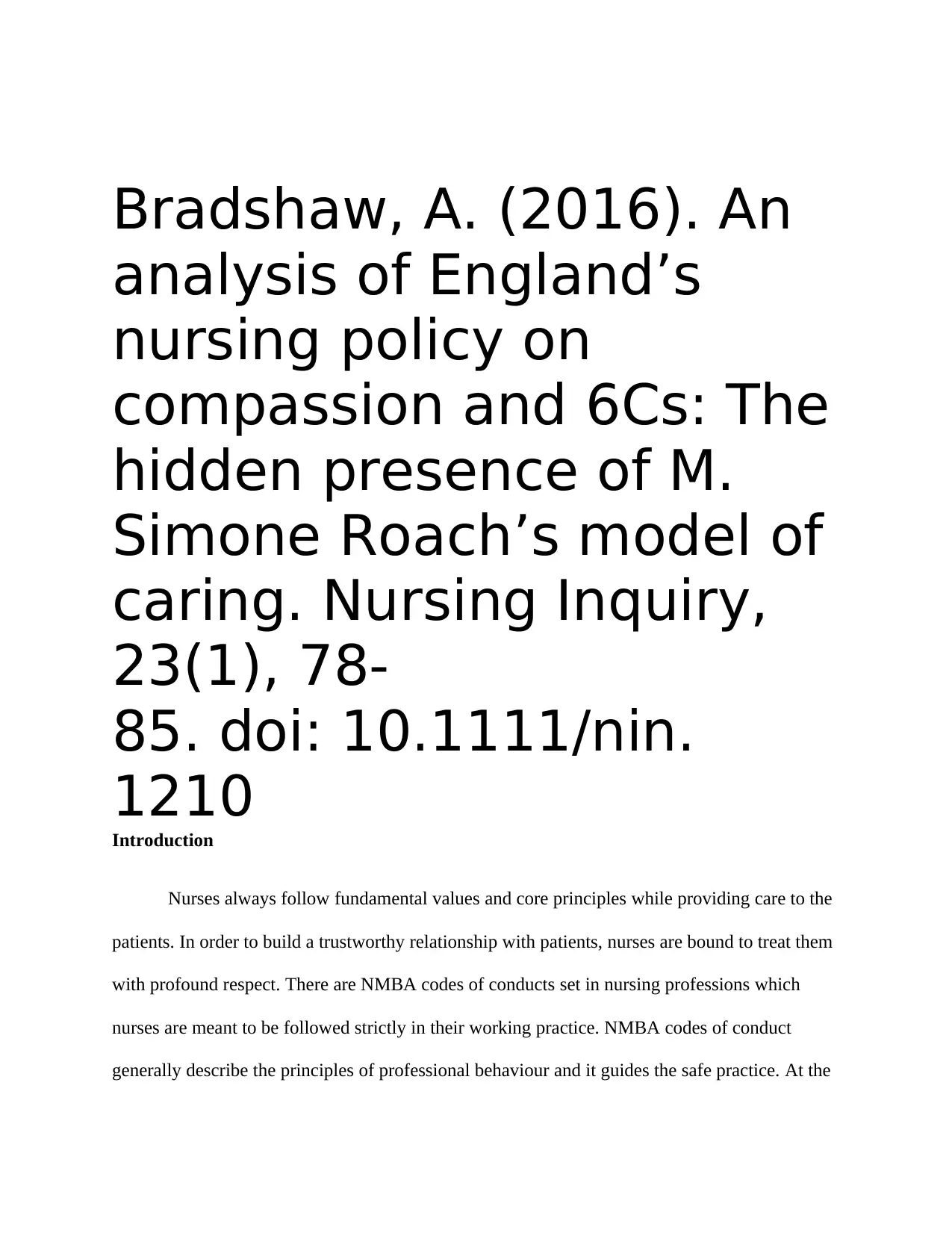
Bradshaw, A. (2016). An
analysis of England’s
nursing policy on
compassion and 6Cs: The
hidden presence of M.
Simone Roach’s model of
caring. Nursing Inquiry,
23(1), 78-
85. doi: 10.1111/nin.
1210
Introduction
Nurses always follow fundamental values and core principles while providing care to the
patients. In order to build a trustworthy relationship with patients, nurses are bound to treat them
with profound respect. There are NMBA codes of conducts set in nursing professions which
nurses are meant to be followed strictly in their working practice. NMBA codes of conduct
generally describe the principles of professional behaviour and it guides the safe practice. At the
analysis of England’s
nursing policy on
compassion and 6Cs: The
hidden presence of M.
Simone Roach’s model of
caring. Nursing Inquiry,
23(1), 78-
85. doi: 10.1111/nin.
1210
Introduction
Nurses always follow fundamental values and core principles while providing care to the
patients. In order to build a trustworthy relationship with patients, nurses are bound to treat them
with profound respect. There are NMBA codes of conducts set in nursing professions which
nurses are meant to be followed strictly in their working practice. NMBA codes of conduct
generally describe the principles of professional behaviour and it guides the safe practice. At the
Paraphrase This Document
Need a fresh take? Get an instant paraphrase of this document with our AI Paraphraser
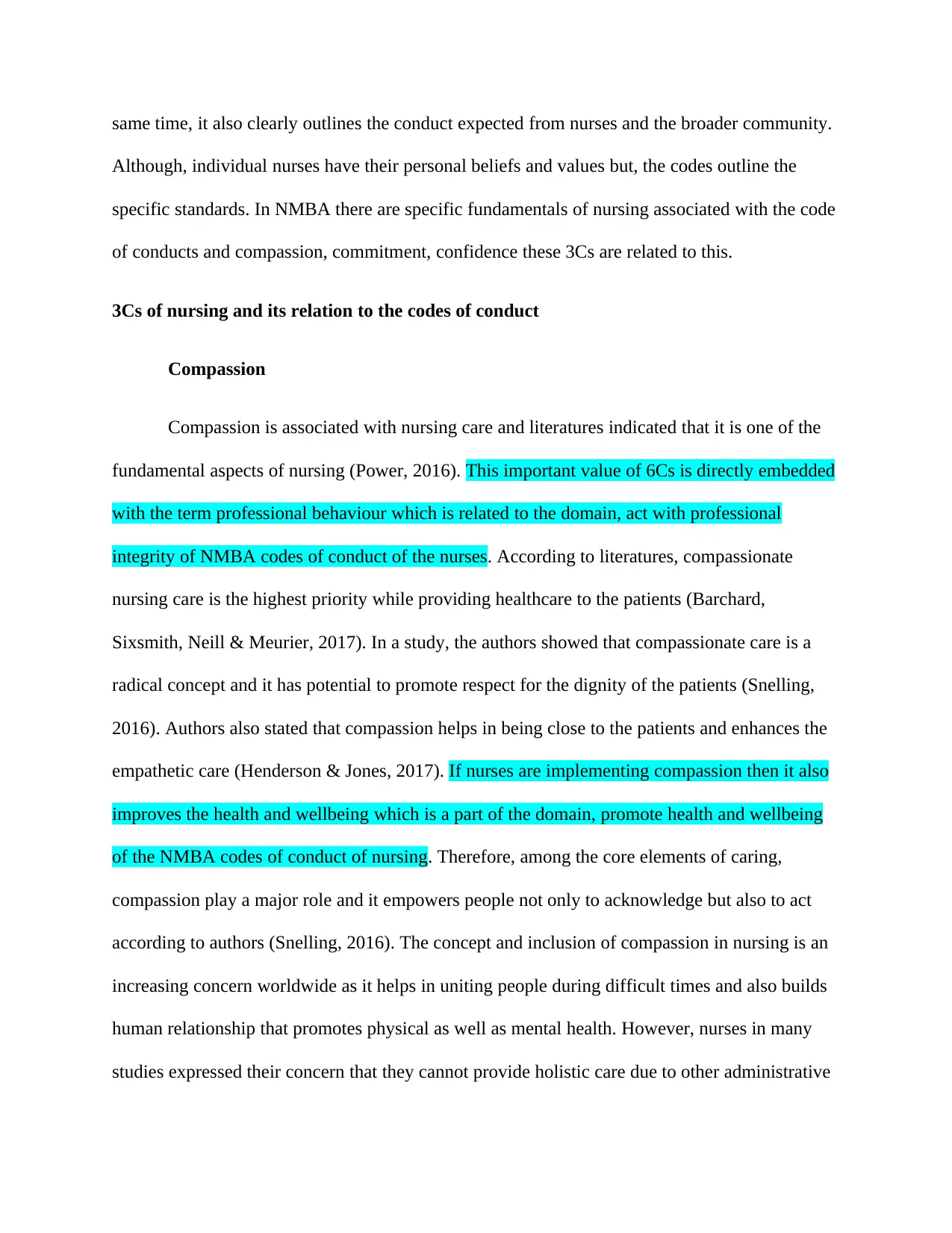
same time, it also clearly outlines the conduct expected from nurses and the broader community.
Although, individual nurses have their personal beliefs and values but, the codes outline the
specific standards. In NMBA there are specific fundamentals of nursing associated with the code
of conducts and compassion, commitment, confidence these 3Cs are related to this.
3Cs of nursing and its relation to the codes of conduct
Compassion
Compassion is associated with nursing care and literatures indicated that it is one of the
fundamental aspects of nursing (Power, 2016). This important value of 6Cs is directly embedded
with the term professional behaviour which is related to the domain, act with professional
integrity of NMBA codes of conduct of the nurses. According to literatures, compassionate
nursing care is the highest priority while providing healthcare to the patients (Barchard,
Sixsmith, Neill & Meurier, 2017). In a study, the authors showed that compassionate care is a
radical concept and it has potential to promote respect for the dignity of the patients (Snelling,
2016). Authors also stated that compassion helps in being close to the patients and enhances the
empathetic care (Henderson & Jones, 2017). If nurses are implementing compassion then it also
improves the health and wellbeing which is a part of the domain, promote health and wellbeing
of the NMBA codes of conduct of nursing. Therefore, among the core elements of caring,
compassion play a major role and it empowers people not only to acknowledge but also to act
according to authors (Snelling, 2016). The concept and inclusion of compassion in nursing is an
increasing concern worldwide as it helps in uniting people during difficult times and also builds
human relationship that promotes physical as well as mental health. However, nurses in many
studies expressed their concern that they cannot provide holistic care due to other administrative
Although, individual nurses have their personal beliefs and values but, the codes outline the
specific standards. In NMBA there are specific fundamentals of nursing associated with the code
of conducts and compassion, commitment, confidence these 3Cs are related to this.
3Cs of nursing and its relation to the codes of conduct
Compassion
Compassion is associated with nursing care and literatures indicated that it is one of the
fundamental aspects of nursing (Power, 2016). This important value of 6Cs is directly embedded
with the term professional behaviour which is related to the domain, act with professional
integrity of NMBA codes of conduct of the nurses. According to literatures, compassionate
nursing care is the highest priority while providing healthcare to the patients (Barchard,
Sixsmith, Neill & Meurier, 2017). In a study, the authors showed that compassionate care is a
radical concept and it has potential to promote respect for the dignity of the patients (Snelling,
2016). Authors also stated that compassion helps in being close to the patients and enhances the
empathetic care (Henderson & Jones, 2017). If nurses are implementing compassion then it also
improves the health and wellbeing which is a part of the domain, promote health and wellbeing
of the NMBA codes of conduct of nursing. Therefore, among the core elements of caring,
compassion play a major role and it empowers people not only to acknowledge but also to act
according to authors (Snelling, 2016). The concept and inclusion of compassion in nursing is an
increasing concern worldwide as it helps in uniting people during difficult times and also builds
human relationship that promotes physical as well as mental health. However, nurses in many
studies expressed their concern that they cannot provide holistic care due to other administrative
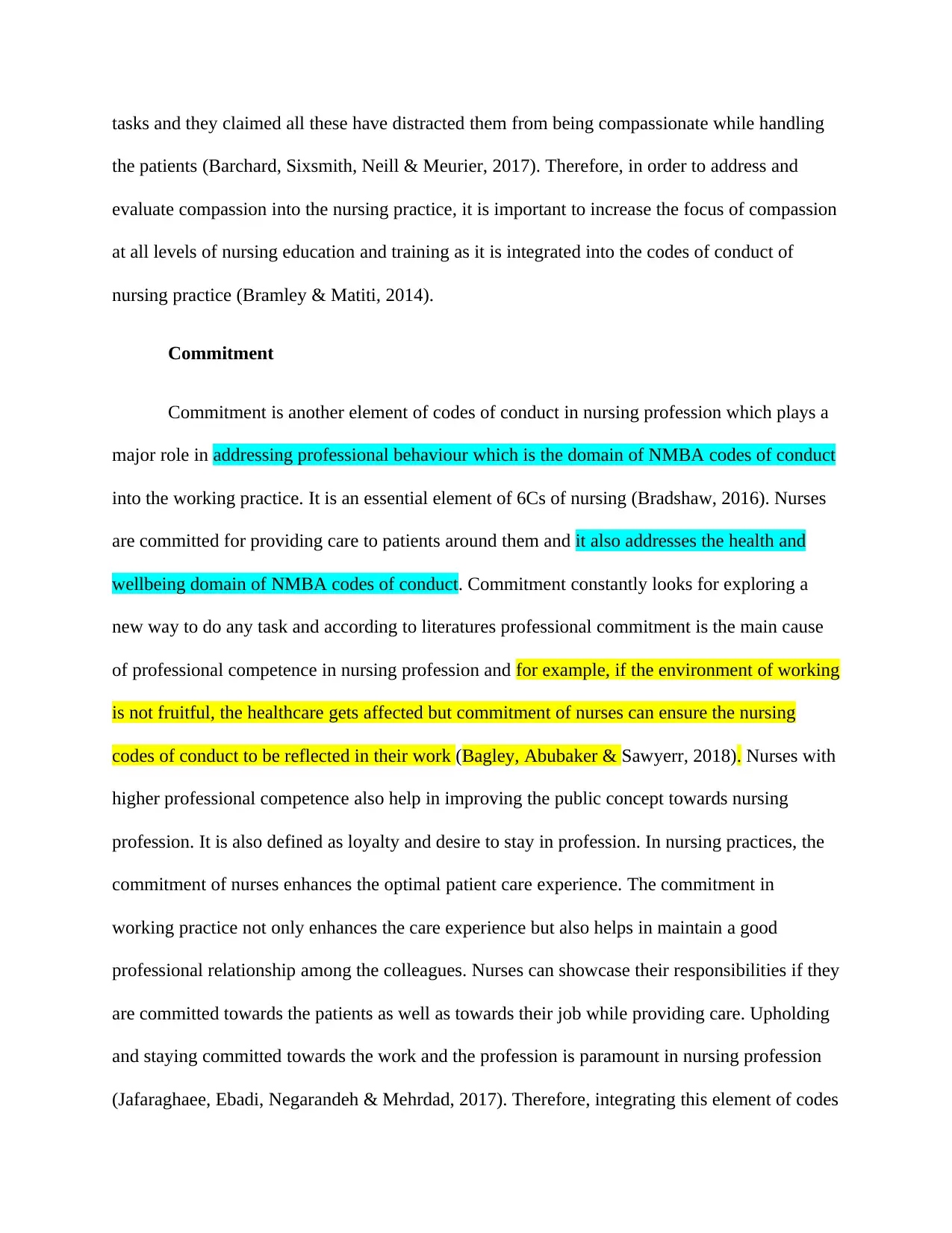
tasks and they claimed all these have distracted them from being compassionate while handling
the patients (Barchard, Sixsmith, Neill & Meurier, 2017). Therefore, in order to address and
evaluate compassion into the nursing practice, it is important to increase the focus of compassion
at all levels of nursing education and training as it is integrated into the codes of conduct of
nursing practice (Bramley & Matiti, 2014).
Commitment
Commitment is another element of codes of conduct in nursing profession which plays a
major role in addressing professional behaviour which is the domain of NMBA codes of conduct
into the working practice. It is an essential element of 6Cs of nursing (Bradshaw, 2016). Nurses
are committed for providing care to patients around them and it also addresses the health and
wellbeing domain of NMBA codes of conduct. Commitment constantly looks for exploring a
new way to do any task and according to literatures professional commitment is the main cause
of professional competence in nursing profession and for example, if the environment of working
is not fruitful, the healthcare gets affected but commitment of nurses can ensure the nursing
codes of conduct to be reflected in their work (Bagley, Abubaker & Sawyerr, 2018). Nurses with
higher professional competence also help in improving the public concept towards nursing
profession. It is also defined as loyalty and desire to stay in profession. In nursing practices, the
commitment of nurses enhances the optimal patient care experience. The commitment in
working practice not only enhances the care experience but also helps in maintain a good
professional relationship among the colleagues. Nurses can showcase their responsibilities if they
are committed towards the patients as well as towards their job while providing care. Upholding
and staying committed towards the work and the profession is paramount in nursing profession
(Jafaraghaee, Ebadi, Negarandeh & Mehrdad, 2017). Therefore, integrating this element of codes
the patients (Barchard, Sixsmith, Neill & Meurier, 2017). Therefore, in order to address and
evaluate compassion into the nursing practice, it is important to increase the focus of compassion
at all levels of nursing education and training as it is integrated into the codes of conduct of
nursing practice (Bramley & Matiti, 2014).
Commitment
Commitment is another element of codes of conduct in nursing profession which plays a
major role in addressing professional behaviour which is the domain of NMBA codes of conduct
into the working practice. It is an essential element of 6Cs of nursing (Bradshaw, 2016). Nurses
are committed for providing care to patients around them and it also addresses the health and
wellbeing domain of NMBA codes of conduct. Commitment constantly looks for exploring a
new way to do any task and according to literatures professional commitment is the main cause
of professional competence in nursing profession and for example, if the environment of working
is not fruitful, the healthcare gets affected but commitment of nurses can ensure the nursing
codes of conduct to be reflected in their work (Bagley, Abubaker & Sawyerr, 2018). Nurses with
higher professional competence also help in improving the public concept towards nursing
profession. It is also defined as loyalty and desire to stay in profession. In nursing practices, the
commitment of nurses enhances the optimal patient care experience. The commitment in
working practice not only enhances the care experience but also helps in maintain a good
professional relationship among the colleagues. Nurses can showcase their responsibilities if they
are committed towards the patients as well as towards their job while providing care. Upholding
and staying committed towards the work and the profession is paramount in nursing profession
(Jafaraghaee, Ebadi, Negarandeh & Mehrdad, 2017). Therefore, integrating this element of codes
⊘ This is a preview!⊘
Do you want full access?
Subscribe today to unlock all pages.

Trusted by 1+ million students worldwide
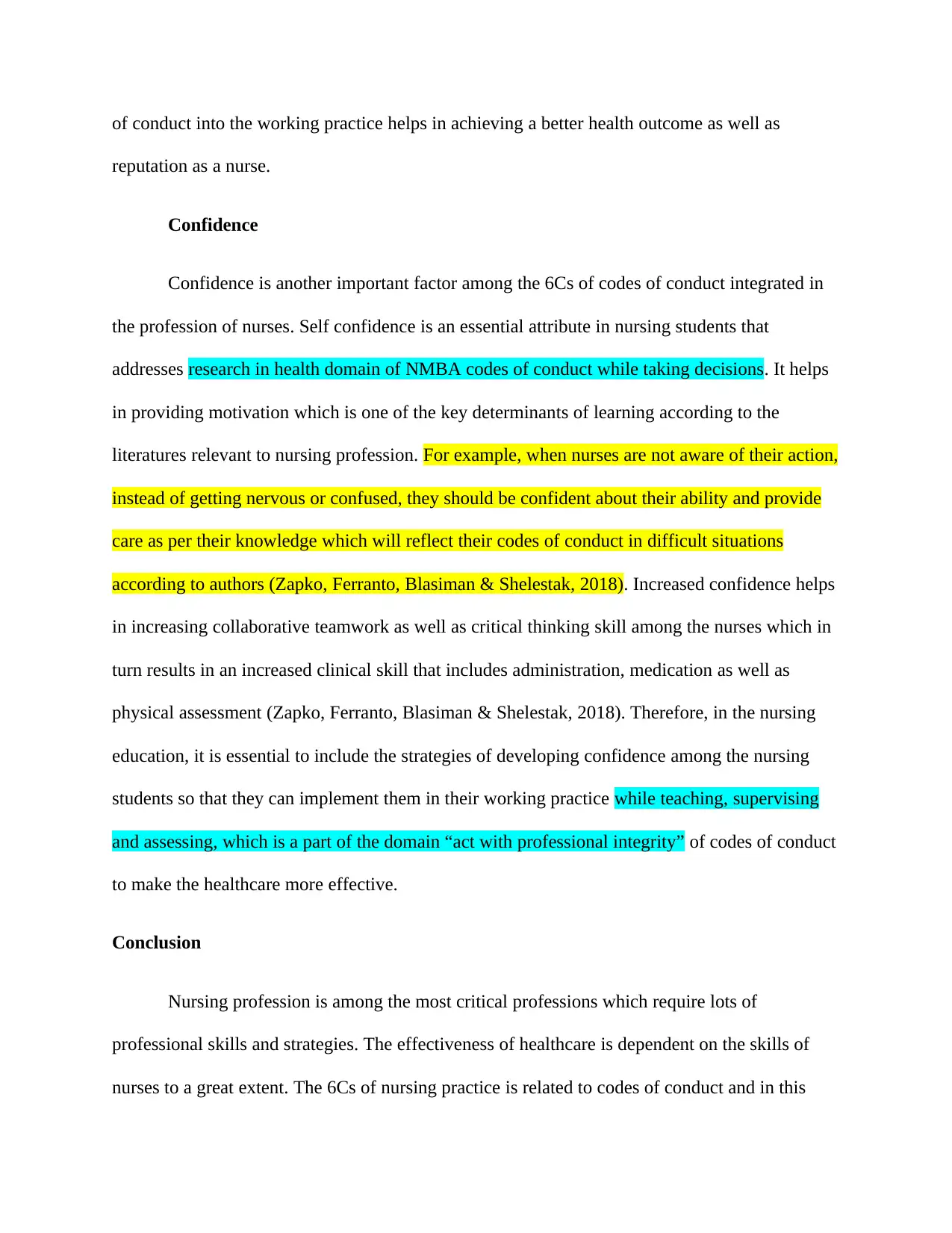
of conduct into the working practice helps in achieving a better health outcome as well as
reputation as a nurse.
Confidence
Confidence is another important factor among the 6Cs of codes of conduct integrated in
the profession of nurses. Self confidence is an essential attribute in nursing students that
addresses research in health domain of NMBA codes of conduct while taking decisions. It helps
in providing motivation which is one of the key determinants of learning according to the
literatures relevant to nursing profession. For example, when nurses are not aware of their action,
instead of getting nervous or confused, they should be confident about their ability and provide
care as per their knowledge which will reflect their codes of conduct in difficult situations
according to authors (Zapko, Ferranto, Blasiman & Shelestak, 2018). Increased confidence helps
in increasing collaborative teamwork as well as critical thinking skill among the nurses which in
turn results in an increased clinical skill that includes administration, medication as well as
physical assessment (Zapko, Ferranto, Blasiman & Shelestak, 2018). Therefore, in the nursing
education, it is essential to include the strategies of developing confidence among the nursing
students so that they can implement them in their working practice while teaching, supervising
and assessing, which is a part of the domain “act with professional integrity” of codes of conduct
to make the healthcare more effective.
Conclusion
Nursing profession is among the most critical professions which require lots of
professional skills and strategies. The effectiveness of healthcare is dependent on the skills of
nurses to a great extent. The 6Cs of nursing practice is related to codes of conduct and in this
reputation as a nurse.
Confidence
Confidence is another important factor among the 6Cs of codes of conduct integrated in
the profession of nurses. Self confidence is an essential attribute in nursing students that
addresses research in health domain of NMBA codes of conduct while taking decisions. It helps
in providing motivation which is one of the key determinants of learning according to the
literatures relevant to nursing profession. For example, when nurses are not aware of their action,
instead of getting nervous or confused, they should be confident about their ability and provide
care as per their knowledge which will reflect their codes of conduct in difficult situations
according to authors (Zapko, Ferranto, Blasiman & Shelestak, 2018). Increased confidence helps
in increasing collaborative teamwork as well as critical thinking skill among the nurses which in
turn results in an increased clinical skill that includes administration, medication as well as
physical assessment (Zapko, Ferranto, Blasiman & Shelestak, 2018). Therefore, in the nursing
education, it is essential to include the strategies of developing confidence among the nursing
students so that they can implement them in their working practice while teaching, supervising
and assessing, which is a part of the domain “act with professional integrity” of codes of conduct
to make the healthcare more effective.
Conclusion
Nursing profession is among the most critical professions which require lots of
professional skills and strategies. The effectiveness of healthcare is dependent on the skills of
nurses to a great extent. The 6Cs of nursing practice is related to codes of conduct and in this
Paraphrase This Document
Need a fresh take? Get an instant paraphrase of this document with our AI Paraphraser

paper, 3Cs have been clearly discussed. Including the knowledge of these Cs are highly
necessary into the nursing education. It will help the nurses in achieving a better professional
experience by providing a better health outcome of the patients.
necessary into the nursing education. It will help the nurses in achieving a better professional
experience by providing a better health outcome of the patients.
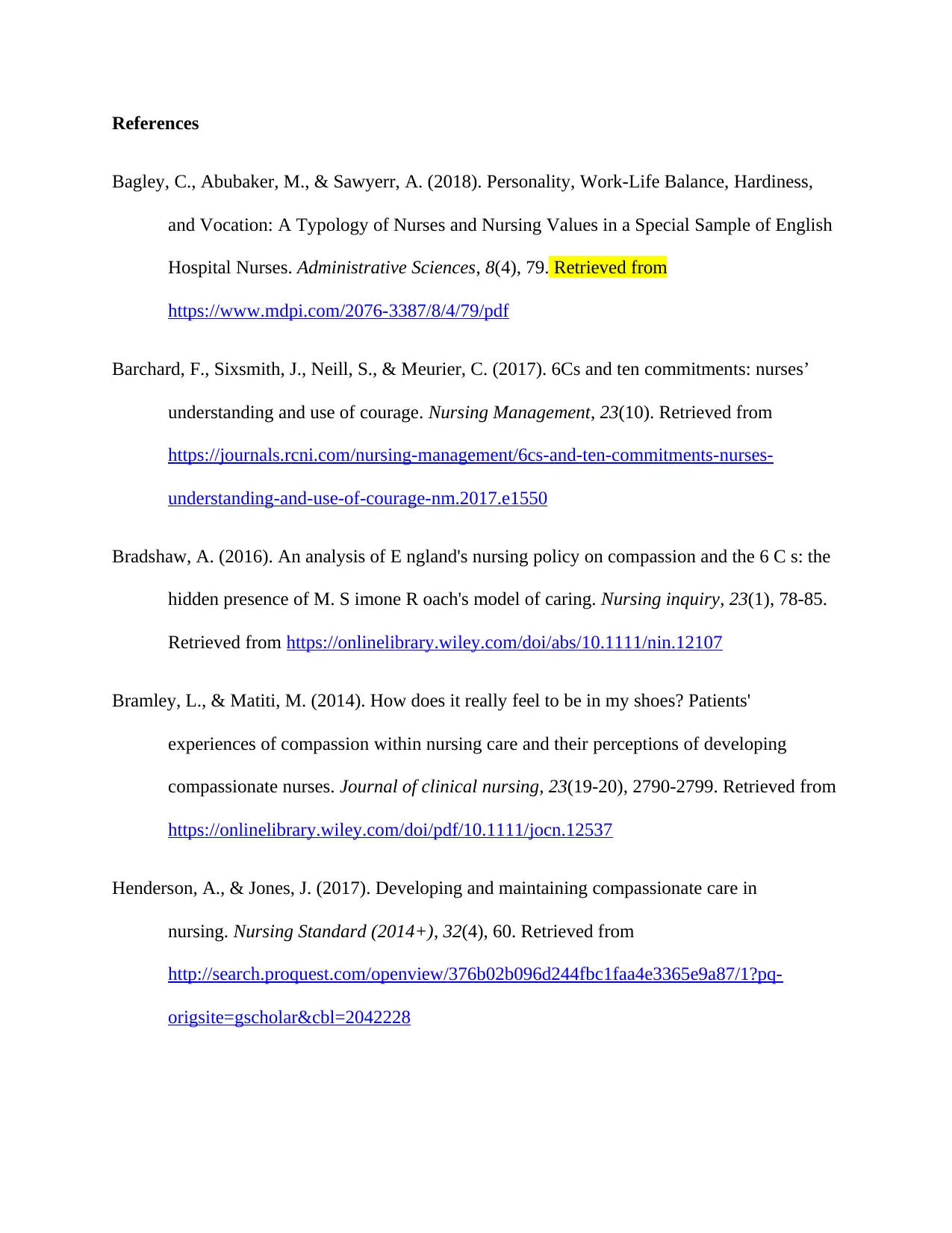
References
Bagley, C., Abubaker, M., & Sawyerr, A. (2018). Personality, Work-Life Balance, Hardiness,
and Vocation: A Typology of Nurses and Nursing Values in a Special Sample of English
Hospital Nurses. Administrative Sciences, 8(4), 79. Retrieved from
https://www.mdpi.com/2076-3387/8/4/79/pdf
Barchard, F., Sixsmith, J., Neill, S., & Meurier, C. (2017). 6Cs and ten commitments: nurses’
understanding and use of courage. Nursing Management, 23(10). Retrieved from
https://journals.rcni.com/nursing-management/6cs-and-ten-commitments-nurses-
understanding-and-use-of-courage-nm.2017.e1550
Bradshaw, A. (2016). An analysis of E ngland's nursing policy on compassion and the 6 C s: the
hidden presence of M. S imone R oach's model of caring. Nursing inquiry, 23(1), 78-85.
Retrieved from https://onlinelibrary.wiley.com/doi/abs/10.1111/nin.12107
Bramley, L., & Matiti, M. (2014). How does it really feel to be in my shoes? Patients'
experiences of compassion within nursing care and their perceptions of developing
compassionate nurses. Journal of clinical nursing, 23(19-20), 2790-2799. Retrieved from
https://onlinelibrary.wiley.com/doi/pdf/10.1111/jocn.12537
Henderson, A., & Jones, J. (2017). Developing and maintaining compassionate care in
nursing. Nursing Standard (2014+), 32(4), 60. Retrieved from
http://search.proquest.com/openview/376b02b096d244fbc1faa4e3365e9a87/1?pq-
origsite=gscholar&cbl=2042228
Bagley, C., Abubaker, M., & Sawyerr, A. (2018). Personality, Work-Life Balance, Hardiness,
and Vocation: A Typology of Nurses and Nursing Values in a Special Sample of English
Hospital Nurses. Administrative Sciences, 8(4), 79. Retrieved from
https://www.mdpi.com/2076-3387/8/4/79/pdf
Barchard, F., Sixsmith, J., Neill, S., & Meurier, C. (2017). 6Cs and ten commitments: nurses’
understanding and use of courage. Nursing Management, 23(10). Retrieved from
https://journals.rcni.com/nursing-management/6cs-and-ten-commitments-nurses-
understanding-and-use-of-courage-nm.2017.e1550
Bradshaw, A. (2016). An analysis of E ngland's nursing policy on compassion and the 6 C s: the
hidden presence of M. S imone R oach's model of caring. Nursing inquiry, 23(1), 78-85.
Retrieved from https://onlinelibrary.wiley.com/doi/abs/10.1111/nin.12107
Bramley, L., & Matiti, M. (2014). How does it really feel to be in my shoes? Patients'
experiences of compassion within nursing care and their perceptions of developing
compassionate nurses. Journal of clinical nursing, 23(19-20), 2790-2799. Retrieved from
https://onlinelibrary.wiley.com/doi/pdf/10.1111/jocn.12537
Henderson, A., & Jones, J. (2017). Developing and maintaining compassionate care in
nursing. Nursing Standard (2014+), 32(4), 60. Retrieved from
http://search.proquest.com/openview/376b02b096d244fbc1faa4e3365e9a87/1?pq-
origsite=gscholar&cbl=2042228
⊘ This is a preview!⊘
Do you want full access?
Subscribe today to unlock all pages.

Trusted by 1+ million students worldwide
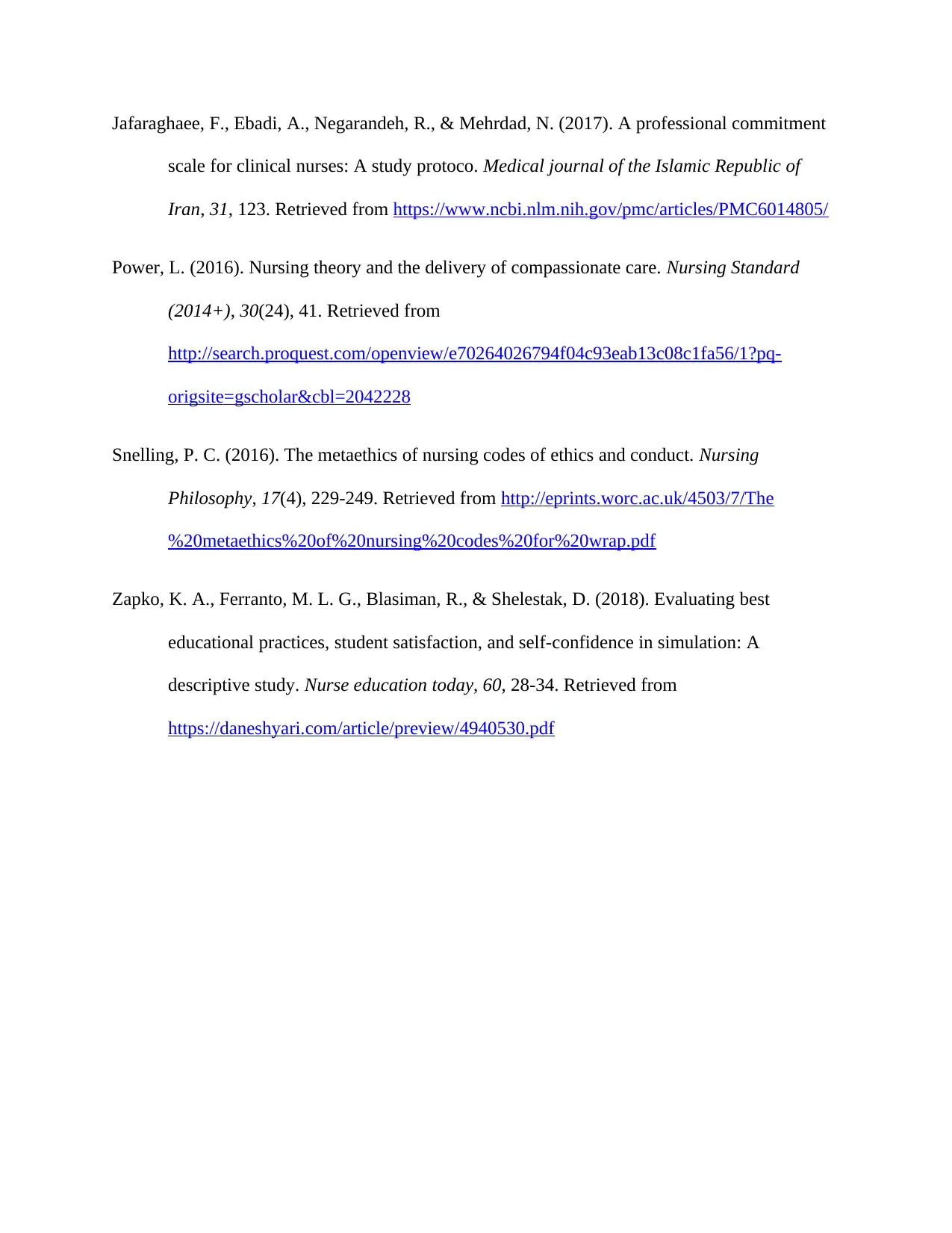
Jafaraghaee, F., Ebadi, A., Negarandeh, R., & Mehrdad, N. (2017). A professional commitment
scale for clinical nurses: A study protoco. Medical journal of the Islamic Republic of
Iran, 31, 123. Retrieved from https://www.ncbi.nlm.nih.gov/pmc/articles/PMC6014805/
Power, L. (2016). Nursing theory and the delivery of compassionate care. Nursing Standard
(2014+), 30(24), 41. Retrieved from
http://search.proquest.com/openview/e70264026794f04c93eab13c08c1fa56/1?pq-
origsite=gscholar&cbl=2042228
Snelling, P. C. (2016). The metaethics of nursing codes of ethics and conduct. Nursing
Philosophy, 17(4), 229-249. Retrieved from http://eprints.worc.ac.uk/4503/7/The
%20metaethics%20of%20nursing%20codes%20for%20wrap.pdf
Zapko, K. A., Ferranto, M. L. G., Blasiman, R., & Shelestak, D. (2018). Evaluating best
educational practices, student satisfaction, and self-confidence in simulation: A
descriptive study. Nurse education today, 60, 28-34. Retrieved from
https://daneshyari.com/article/preview/4940530.pdf
scale for clinical nurses: A study protoco. Medical journal of the Islamic Republic of
Iran, 31, 123. Retrieved from https://www.ncbi.nlm.nih.gov/pmc/articles/PMC6014805/
Power, L. (2016). Nursing theory and the delivery of compassionate care. Nursing Standard
(2014+), 30(24), 41. Retrieved from
http://search.proquest.com/openview/e70264026794f04c93eab13c08c1fa56/1?pq-
origsite=gscholar&cbl=2042228
Snelling, P. C. (2016). The metaethics of nursing codes of ethics and conduct. Nursing
Philosophy, 17(4), 229-249. Retrieved from http://eprints.worc.ac.uk/4503/7/The
%20metaethics%20of%20nursing%20codes%20for%20wrap.pdf
Zapko, K. A., Ferranto, M. L. G., Blasiman, R., & Shelestak, D. (2018). Evaluating best
educational practices, student satisfaction, and self-confidence in simulation: A
descriptive study. Nurse education today, 60, 28-34. Retrieved from
https://daneshyari.com/article/preview/4940530.pdf
1 out of 7
Related Documents
Your All-in-One AI-Powered Toolkit for Academic Success.
+13062052269
info@desklib.com
Available 24*7 on WhatsApp / Email
![[object Object]](/_next/static/media/star-bottom.7253800d.svg)
Unlock your academic potential
Copyright © 2020–2026 A2Z Services. All Rights Reserved. Developed and managed by ZUCOL.





